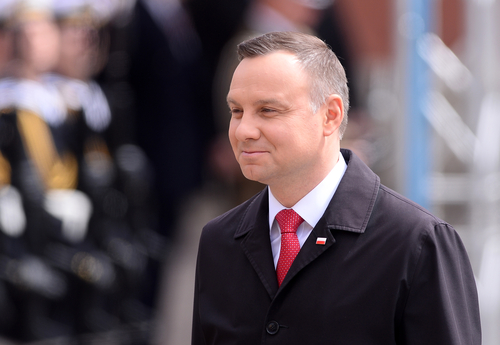Poland president vetoes bill forcing top justices' resignations; ABA had voiced concern

Andrzej Duda. fotokibit / Shutterstock.com
Updated: Poland's president on Monday said he is vetoing legislation that would have forced the country's 83 Supreme Court justices to resign and would have given the Law & Justice Party control over their replacements.
Poland President Andrzej Duda made the announcement after protests and warnings from the European Union, report the New York Times and the BBC.
“I feel that the reform in this shape will not increase the sense of security and justice,” Duda said at a news conference.
Though Duda said he was vetoing the bill that would have forced the resignation of Supreme Court justices, he said he would sign another bill that gives the justice minister the power to select the heads of the local courts.
In a statement released Thursday—when the Law & Justice Party passed the justice-resignation bill in the Polish parliament’s lower house—ABA President Linda A. Klein noted that the proposal follows other troubling developments, including the Polish government’s refusal to seat judges appointed by the Constitutional Tribunal, and comply with judgments of the tribunal. The upper house of Poland’s parliament approved the legislation on Saturday.
“An independent judiciary is a vital check and balance in a democratic society and essential to maintaining the rule of law. The ABA will be closely monitoring the situation and supporting efforts to preserve the independence of the judiciary in Poland,” Klein’s statement reads.
The European Union had said that the legislation violates democracy’s separation of powers in Poland, UPI reported. The EU had warned that it will consider implementing Article 7, a sanction that removes a country’s EU voting rights, over the legislation. According to the news agency, the sanction has never been used before.
Some Poland residents think that the court comes from the country’s communist times and is corrupt, Tomasz Sakiewicz, the editor of the right-wing newspaper Gazeta Polska, told Public Radio International.
There was a large protest Thursday against the proposed legislation at the presidential palace, CNN reported. Since it’s been in power, the Law & Justice Party has also placed more restrictions on the right to peaceful assembly, and created media laws that make it more difficult to have an independent press.
Donald Tusk, a former Polish prime minister who now is president of the European council, has said that under the Law & Justice party’s leadership, the country is in danger of losing decades of progress, The Guardian reports.
“They transport us—in the political sense—in time and in space, backwards and eastwards. The president most certainly thinks otherwise. But not even the deepest differences can absolve us from our duty to work together for the good and safety of our mother country,” Tusk said after speaking with Duda.
Updated at 11:09 p.m. to report that the Poland parliament’s upper house passed the legislation. Updated on Monday to report that Poland’s president vetoed the legislation



